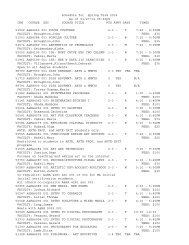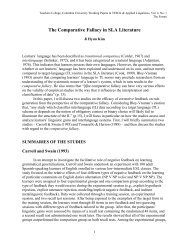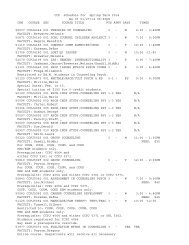UNICEF Mongolia - Teachers College Columbia University
UNICEF Mongolia - Teachers College Columbia University
UNICEF Mongolia - Teachers College Columbia University
Create successful ePaper yourself
Turn your PDF publications into a flip-book with our unique Google optimized e-Paper software.
CHAPTER 5: TOTAL PAY OF TEACHERS AND THE BONUS SYSTEM<br />
level in ways that make it a non-performance-based salary addion. There is a tendency for schools to<br />
give the same amount to all teachers, except for those who are clearly underperforming. Frequently, all<br />
teachers of a school receive 30 percent of their base salary every four months as part of the bonus for<br />
the skills-based quarterly performance. This translates to a salary supplement of 7.5 percent of the base<br />
salary per month for almost every teacher in <strong>Mongolia</strong>.<br />
From the 123 teachers in the database of this study, only one teacher did not receive a quarterly<br />
performance bonus. This means that 99.2 percent of all teachers receive a bonus, most of them for the<br />
same percentage of their base salaries. As menoned before, however, there might have been a selecon<br />
bias among the interviewed teachers and this rao may be over-reported. Therefore, the research team<br />
of this study also interviewed a total of 35 educaon managers in 28 schools and asked how many<br />
teachers did not receive a performance-based bonus in the last quarter. Of the 35 interviewed educaon<br />
managers,<br />
• 29 educaon managers (83 percent) answered “none”; that is all teachers received a quarterly<br />
performance-bonus;<br />
• three educaon managers (9 percent) answered that one teacher (typically a teacher that<br />
clearly underperforms) did not receive the quarterly bonus; and<br />
1<br />
2<br />
3<br />
4<br />
5<br />
6<br />
• three educaon managers (9 percent) answered that there was a problem with the salary fund<br />
and that they have not yet made the quarterly payments.<br />
In other words, only nine percent of schools withhold quarterly bonus payments to teachers. The<br />
educaon managers confirmed that only in exceponal cases is the bonus withheld to signal to the<br />
teacher that major changes in behavior or performance are expected. Thus, the quarterly bonus payments<br />
are not used to reward high-performing teachers, but instead are only used to punish poor-performing<br />
teachers. Apart from the ambiguity of the evaluaon criteria, it is perhaps also for cultural reasons that<br />
only poor performance is punished while high performance is not especially recognized in the form of<br />
bonus payments. Despite aempts to suspend the social redistribuon pracce, seen most recently in<br />
2008 when the award-winning scores were reduced to two categories (A and B), educaon managers<br />
and principals in effect undermine the idea of performance-based bonuses by handing out bonuses to<br />
almost everybody on the staff.<br />
This clearly defeats the purpose of the results-based public administraon reform. In effect, the bonus<br />
funcons as a 13 th monthly base salary rather than as a performance award. What is called into the<br />
queson is not the social redistribuon pracce, but rather the mulplicity of awards that, except for<br />
the controversial Olympiads and compeons, are very vaguely defined and are therefore suscepble to<br />
subjecve judgment and non-formal evaluaon criteria.<br />
5.3. SUMMARY AND RECOMMENDATIONS<br />
The empirical data gathered at the school level enable us to esmate actual salaries or total pay of<br />
teachers. The average total monthly pay of teachers—with addional teaching hours, funconal and rank<br />
supplements, and bonuses—is 374,171 MNT. A typical high-income total pay for a teacher is 546,737<br />
MNT, and a typical low-income total monthly income is 317, 079 MNT.<br />
This chapter also analyzed the bonus system in greater detail. The bonus system in <strong>Mongolia</strong> is deeply<br />
TEACHERS IN MONGOLIA: AN EMPIRICAL STUDY ON RECRUITMENT INTO TEACHING,<br />
PROFESSIONAL DEVELOPMENT, AND RETENTION OF TEACHERS<br />
85




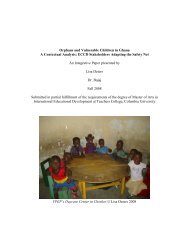
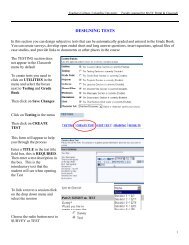
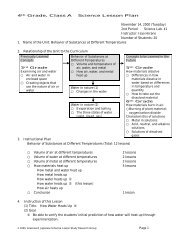

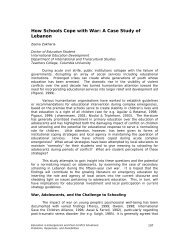
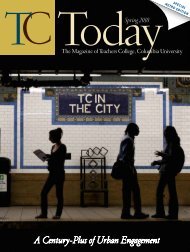



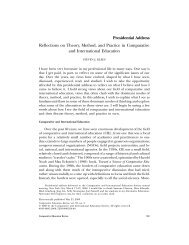
![TC Tod[...].pdf - Teachers College Columbia University](https://img.yumpu.com/27074883/1/190x252/tc-todpdf-teachers-college-columbia-university.jpg?quality=85)
